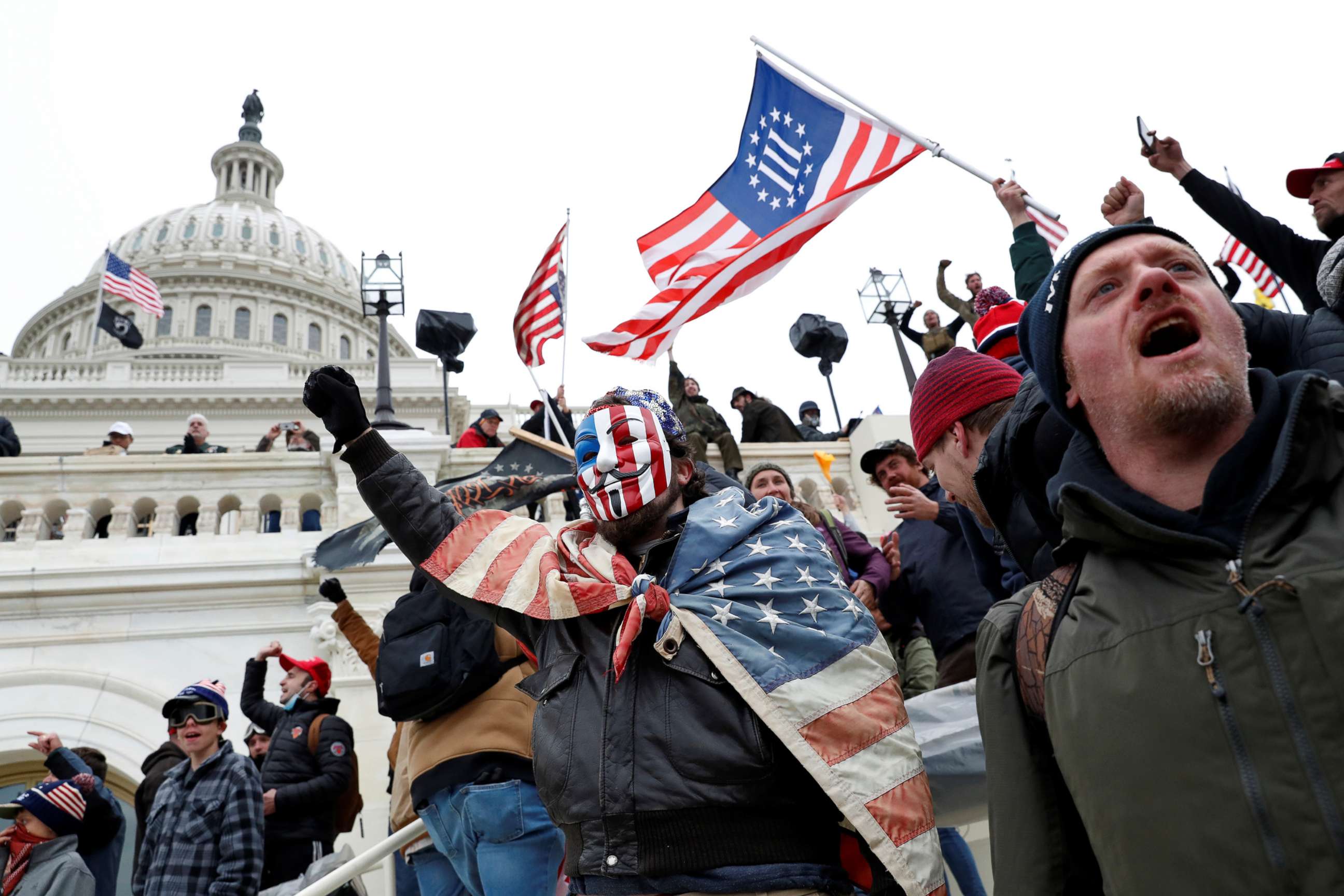Militia extremists developing strategies to work around social media crackdown, DHS memo warns
Militia groups are facing tighter restrictions online after the Capitol riot.
Violent anti-government extremists are developing communication strategies to circumvent recent clampdowns by the government and the tech industry in order to continue recruiting new members and promote their views online, according to a new confidential memo by the Department of Homeland Security.
The report, issued on Monday by the department's Office of Intelligence and Analysis and obtained by ABC News, warns that "some militia violent extremists (MVEs) are actively disguising their online social media outreach to promote violent anti-government narratives, connect with others espousing violent extremist views, and share tactical information by using layered communications," even as social media platforms like Facebook have taken action to mitigate those efforts.
Faced with tighter restrictions online, especially in the wake of the Jan. 6 Capitol insurrection, militia groups have shifted to a "layered strategy" to recruit new members by starting conversations on popular, easy-to-access platforms and gradually shifting the discussions to more secure communication services, "such as private social media groups and encrypted applications," according to the DHS memo.
"Movement to these more secure channels helps MVEs filter or disguise online communications to protect operational security, avoid violating social media platforms' terms of service, and reserve detailed operational discussions for more secure platforms," the memo says.
The report goes on to warn that these groups' efforts to "obfuscate their recruitment of others into these tighter-knit online communities using innocuous postings in public groups" would likely hinder social media companies' efforts to crack down on violent militia groups on their platforms.
The memo lays out three stages of communications that these groups, which include the Boogaloo movement and the Three Percenters, have allegedly resorted to amid the crackdown. It starts with recruiting via popular public apps like Facebook or Twitter, then moving to emerging networks like Parler or MeWe, then finally transitioning to "official private membership group(s)" on secure encrypted messaging applications like Telegram and Signal, which have grown even more popular among extremists following the Capitol riot.
Once recruits are on the more secure platforms, says the memo, there is "frequent communication of violent extremist messaging, sharing of weapons and tactical guides, and other tactics, techniques, and procedures."
Dr. Megan Squire, a computer science professor at Elon University who tracks online extremism for the Southern Poverty Law Center, told ABC News that while the idea that extremists are using social media in "layers" is not new, it shows why applications like Telegram are "so appealing to these groups."
"This two-pronged approach provided by Telegram is a key technical asset for hate and terror groups," Squire wrote in a 2020 report for the Centre for Analysis of the Radical Right (CARR). "Why? Because the platform offers both public channels that can be used for recruitment and propaganda, and the encrypted messaging needed for planning clandestine activity."

"Couple this with lax enforcement of its own policies about prohibited speech, and Telegram becomes a very effective tool for hate," she wrote.
Telegram did not respond to a request by ABC News for comment.
On the other hand, Squire told ABC News, it appears that the bolstered restrictions put in place by some social media platforms are affecting militia groups' recruiting ability by forcing them to be spread out further across the internet.
"I have found that when groups move from one platform to two or three, it does put a few slight speed bumps in the road," Squire said. "It is much harder to onboard someone when you're asking them to learn two or three separate platforms, and each new technology represents an opportunity for the group to make mistakes."
Over the past year, Facebook has worked to tighten its rules against the spread of violence, hate, and misinformation on its platform, including banning groups tied to QAnon and militia movements like Boogaloo. But a new report from Avaaz, a nonprofit civic advocacy group, found that extremist groups continue to thrive on Facebook despite the bans, as evidenced by over 260 Facebook pages from groups that Avaaz said "spread violence-glorifying material in the heat of the 2020 election."
And since the Capitol riot, major platforms like Facebook and Twitter have faced growing scrutiny over their role in allowing the spread of online extremism and misinformation. During a Congressional hearing last week, the three major tech leaders from Google, Facebook, and Twitter were asked to answer "yes" or "no" as to whether their platforms played a role in the lead-up to the storming of the Capitol.
Only Twitter's Jack Dorsey gave a direct answer, saying "Yes" -- but adding, "You also have to take into consideration the broader ecosystem. It's not just about the technological systems that we use."




